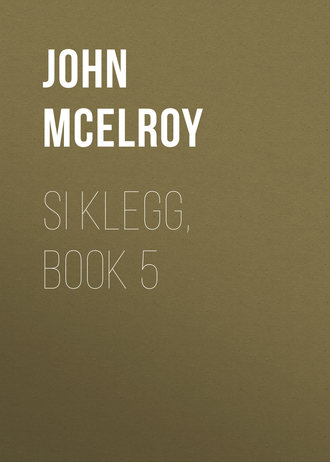 полная версия
полная версияSi Klegg, Book 5
"You girls that want a soldier-beau," she took opportunity to remark at a little pause in the feast, "kin jest set your caps for Mr. Corpril Elliott there. He's in the market. He had a girl up in Bad Ax, Wis., but she went back on him, and married a stay-at-home widower, who's in the lumber business."
There was a general giggle, and a chorus of exclamations at such unpatriotic and unwomanly perfidy. Shorty's appetite fled.
"Maria," thundered Si, "I'll make you pay for this when I git you alone."
"Yes," continued the incorrigible tease; "and they say the best time to ketch a widder is while her eyes is wet. Transplantin's best in wet weather, and the best time to ketch a feller's jest when he's bin jilted."
Si sprang from the table, as if he would catch Maria and slap her. She laughingly threatened him with a big fork in her hand. They happened to look toward Shorty. He had risen from the table, with the sweat pouring from his burning face. He fumbled in his breast for his silk handkerchief. As he pulled it out there came with it the piece of Maria's dress, which Shorty had carefully treasured. It fell to the floor. Shorty saw it, and forgetful of all else, stooped over, picked it up, carefully brushed the dust from it, refolded it and put if back in his pocket. Maria's face changed instantly from laughing raillery, and she made a quick movement to place herself where she would hide from the rest what he was doing.
There was a rap at the door and the Sheriff of the County entered.
"Sorry to disturb you at supper," he said. "But there's some hint of trouble, and I'd like to have you stand by to help me if it comes. The news has gone all over the country of the haul you brung into the' jail this afternoon, and they say their friends are gatherin' for a rescue. So many o' the right kind o' the boys is away in the army that I hardly know where to look for help. I'm sending word around to all I kin reach. There's several o' the boys that're home gittin' well o' wounds that'll be glad to help. I'm sendin' buggies for 'em. They can't walk, but they kin stand up and shoot. I'd like to have you come down to the jail as soon's you git through your supper. And, Serg't Klegg, will you take command? I ain't much on the military, but I'll stay with you and obey orders."
"All right. Sheriff; we'll be right down," responded Si with alacrity. "Git together a few of the boys, and we'll stand off the Knights. There won't be much trouble, I think."
The prospect of a fight transformed Shorty. His shamefacedness vanished instantly, and he straightened up to his full hight with his eyes shining.
"I don't think there's need o' disturbin' the other boys. Sheriff," he said. "I guess me and Si'll be able to stand off any crowd that they're likely to run up aginst us."
"Don't know about that," said the Sheriff doubtfully. "They've bin gittin' sassier and sassier lately, and've showed more willingness to fight. They've put up several very nasty little shindies at one place or another. Out at Charleston, Ill., they killed the Sheriff and a lot o' soldiers right in the Courthouse yard in broad daylight. I believe they've got rebels for officers. We mustn't take no chances."
"Let 'em come on," said Si. "We've run up aginst rebels before. We'll be down to the jail in a few minutes. Sheriff."
The Sheriff's words had banished the ready laughter from the girls' lips, and taken away their appetites, but seemed to have sharpened those of Si and Shorty.
"Here, Maria," called out Si, as he resumed his place at the table with Shorty, while the girls grouped together and whispered anxiously, "bring us in some more o' them slapjacks. We may have to be up all night, and want somethin' that'll stay by us."
"Yes," echoed Shorty, speaking for the first time since he had come into the house; "I feel as if I'd like to begin all over agin."
"I wish you could begin all over agin," said Maria in a tone very different from her former one. "I'd like to cook another supper for you. I wish I could do something to help. Can't I go with you and do something—load guns, or something? I've read about women doin' somethin' o' that kind in the Injun fightin'."
"If you could git 'em within range o' your tongue, Maria," said Si merrily, "you'd scatter, 'em in short order. No; you stay here, and say your prayers, and go to bed like a good girl, and don't worry about us. We'll come out all right. It's the other fellers' womenfolks that've cause to worry. Let them stay up and walk the floor."
As the boys walked down to the jail they saw in the darkness squads of men moving around in a portentious way. At the jail were the Sheriff, wearing an anxious look, two or three citizens, and several soldiers, some with their arms in slings, others on crutches.
"I'm so glad you've come," said the Sheriff. "Things is beginnin' to look very ugly outside. They've got the whole country stirred up, and men are coming in on every road. You take command, Sergeant Klegg. I've bin waitin' for you, so's I could drive over to the station and send a dispatch to the Governor. The station's about a mile from here, but I'll be back as soon as my horse'll bring me. I didn't want to send the dispatch till I was sure there was need of it, for I don't want to bring soldiers here for nothin'."
The wheels of the Sheriff's buggy rattled over the graveled road, and a minute later there was a knock at the outside door. Si opened it and saw there a young man with a smoothly-shaven face, a shock of rumpled hair and wearing a silk hat, a black frockcoat and seedy vest and pantaloons. Si at once recognized him as a lawyer of the place.
"Who's in charge here?" he asked.
"I am, for the present," said Si.
"There it is," said he, in a loud voice, that others might hear; "a military guard over citizens arrested without warrant of law. I have come, sir, in the name of the people of Indiana, to demand the immediate release of those men."
"You kin go, sir, and report to them people that it won't be did," answered Si firmly.
"But they've been arrested without due process of law. They've been arrested in violation of the Constitution and laws of the State of Indiana, which provide—"
"I ain't here to run no debatin' society," Si interrupted, "but to obey my orders, which is to hold these men safe and secure till otherwise ordered."
"I give you fair warning that you will save bloodshed by releasing the men peaceably. We don't want to shed blood, but—"
"We'll take care o' the bloodshed," said Si, nonchalantly. "We're in that business. We git $13 a month for it."
"Do you defy the sovereign people of Indiana, you military autocrat?" said the lawyer.
"Look here, mister," said Shorty, striding forward. "Don't you call my pardner no names, especially none like that. If you want a fight we're here to accommodate you till you git plum-full of it. But you musn't call no sich names as that, or I'll knock your head off."
"Whose head'll you knock off?" said a burly man, thrusting himself in front of the lawyer, with his fist doubled.
"Yours, for example," promptly responded Shorty, sending out his mighty right against the man's head.
"Don't be a fool, Markham," said the lawyer, catching the man and pushing him back into the crowd behind. "Now, sir, Sergeant, or Captain, or Colonel, whatever you may call yourself, for I despise military titles, and don't pretend to know them, I again demand the release of those men. You'll be foolish to attempt to resist, for we've men enough to tear you limb from limb, and jerk down the jail over your heads. Look out for yourself. You can see that the courtyard is full of men. They are determined—desperate, for they have groaned under the iron heel of tyranny."
"O, cheese that stump-speech," said Si, weariedly. "'Taint in our enlistment papers to have to listen to 'em. You've bin warnin', now I'll do a little. I'll shoot the first man that attempts to enter this jail till the Sheriff gits back. If you begin any shootin' we'll begin right into your crowd, and we'll make you sick. There's some warnin' that means somethin'."
"Your blood be on your own heads, then, you brass-button despots," said the lawyer, retiring into the darkness and the crowd. He seemed to give a signal, for a rocket shot up into the air, followed by wild yells from the mob. The large wooden stable in the Courthouse yard burst into flames, and the prisoners inside yelled viciously in response. There was a fusillade of shots, apparently excited and aimless, for none of them struck near.
"Don't fire, boys," said Si, walking around among his guards, "until there is some reason for it. They'll probably try to make a rush and batter down the jail door. We'll watch for that."
The glare of the burning building showed them preparing for that move. A gang had torn off the heavy rail from the hitching-post on the outside of the square, and were going to use it as a battering-ram. Then came another kind of yell from farther away, and suddenly the mob began running in wild confusion, while into the glare swept a line of soldiers, charging with fixed bayonets.
"A train came in while I was at the depot," the Sheriff explained, as he entered the office. "It had on it a regiment going home on veteran furlough. I asked the Major in command to come over and help us. He and his boys was only too glad for a chance to have some fun and stretch their legs. They came off the cars with a whoop as soon's they knowed what was wanted. Now, you boys kin go home and git a good night's sleep. I'll take these prisoners along with the regiment over to the next County seat, and keep 'em there till things cool down here. I'm awfully obliged to you."
"Don't mention it. Glad to do a little thing like that for you any time," responded Si, as he and Shorty shook hands with the Sheriff.
At the next corner, after leaving the Courthouse square, they met Maria and Martha.
"I just couldn't stay in the house while this was goin' on," Maria explained. "I had to come out and see. O, I'm so glad it's all over and you're not hurt."
She caught Shorty's arm with a fervor that made him thrill all over.
CHAPTER XV. OFF FOR THE FRONT
SI AND SHORTY TAKE CHARGE OF A SQUAD OF RECRUITSWHEN the boys came to breakfast the next morning, they found Maria with the hollyhock effulgence of garb of the day before changed to the usual prim simplicity of her housedress. This meant admiration striking Shorty still dumber. He was in that state of mind when every change in the young woman's appearance seemed a marvelous transformation and made her more captivating than before. He had thought her queenly dazzling in her highly-colored "go-to-meeting" plumage of the day before. She was now simply overpowering in her plain, close-fitting calico, that outlined her superb bust and curves, with her hair combed smoothly back from her bright, animated face. Shorty devoured her with his eyes—that is, when she was not looking in his direction. He would rather watch her than eat his breakfast, but when her glance turned toward him he would drop his eyes to his plate. This became plain to everybody, even Maria, but did not prevent her beginning to tease.
"What's the matter with you? Where's your appetite?" asked she. "You're clean off your feed. You must be in love. Nothin' else'd make a man go back on these slapjacks that Cousin Marthy made with her own hands, and she kin beat the County on slapjacks. Mebbe you're thinkin' o' your Bad Ax girl and her widower. Perk up. He may fall offen a saw-log and git drowned, and you git her yit. Never kin tell. Life's mighty uncertain, especially around saw-mills. When I marry a man he's got to give bonds not to have anything to do, in no way or shape, with saw-mills. I don't want to be a widder, or take care o' half a man for the rest o' my days. You've got a chance to git your girl yit. Mebbe she'll git tired o' him after he's bin run through the mill two or three times, and there's more o' him in the graveyard than there is walkin' to church with her. Cheer up."
Shorty tried to disprove the charge as to the subject of his thoughts by falling to furiously and with such precipitation that he spilt his coffee, upset the molasses-jug, and then collapsed in dismay at his clumsiness.
Maria did not go free herself. The other girls had not been blind to Shorty's condition of mind, and rather suspected that Maria was not wholly indifferent to him. When she came into the kitchen for another supply. Cousin Susie, younger sister of Martha, remarked:
"Maria, I've a notion to take your advice, and set my cap for Corpril Shorty. Do you know, I think he's very good lookin'. He's a little rough and clumsy, but a girl could take that out o' him. I believe I'll begin right away. You stay in here and bake and I'll wait on the table."
"Don't be a little goose, Susie," said Maria severely. "You're too young yit to think about beaux. You hain't got used to long dresses yit. You go practice on boys in roundabouts awhile. This is a full-grown man and a soldier. He hain't got no time to waste on schoolgirls."
"Ha, how you talk, Miss Jealousy," responded Susie. "How scared you are lest I cut you out. I've a great mind to do it, just to show you I kin. I'd like awfully to have a sweetheart down at the front, just to crow over the rest o' the girls. Here, you take the turner and let me carry that plate in."
"I'll do nothin' o' the kind," said Maria, decisively. "You look out for your cakes there. They're burnin' while you're gossipin'. That's my brother and his friend, and I hain't got but a short time to be with 'em. I may never see 'em agin, and I want to do all I kin for 'em while they're with me."
"Too bad about your brother," laughed Susie. "How lovin' and attentive all at once. I remember how you used to wig him without mercy at school, and try to make him go off and take me home, instid o' taggin' along after you, when that big-eyed school teacher that sung tenor'd be makin' sheep's eyes at you in school, and wantin' to walk home with you in the evenin'. I remember your slappin' Si for tellin' the folks at home about the teacher and you takin' long walks at noon out to the honeysuckle patch. I've a great mind to go in and tell it all to Si right before that feller. Then your cake'll all be dough. Don't git too uppish with me, young lady. Gi' me that plate and let me take it in."
The cakes on the griddles burned while Maria watched through the door what she mentally described as the "arts and manuvers o' that sassy little piece." She was gratified to see that Shorty's eyes kept glancing at the door for her own reappearance. She carried in the next plate of cakes herself, and though they were a little scorched, Shorty ate them with more zest than any of their predecessors.
Si announced, as he shoved back from the table:
"Well, we've got to go right off. We must ketch that accommodation and git back to Bean Blossom Crick. I want to say good-by to the folks, and then strike out for Jeffersonville. I've reported that I'm able for dooty agin, and there's orders at home for me and Shorty to go to Jeffersonville and git a gang o' recruits that's bin gethered there, and bring 'em to the rijimint."
Shorty had been in hopes that Si would dally for a day or so in these pleasant pastures, but then he reflected that where Annabel was was likely to be much more attractive to Si than where she was not.
"No need o' my goin' back with you," he ventured to suggest, speaking for the first time. "I might take the train goin' East, and git things in shape at Jeffersonville by the time you come."
Then his face grew hot with the thought that everyone saw through his transparent scheme to get an hour or two more with Maria.
"No," said Si, decisively. "You'll go back with me. Father and mother and 'Mandy are all anxious to see you, and they'll never forgive me if I don't bring you back with me. Le's start."
If, at parting. Shorty had mustered up courage enough to look Maria squarely in the eyes, he might have read something there to encourage him, but no deeply-smitten man ever can do this. There is where the "light o' loves" have the great advantage. He could only grip her hand convulsively for an instant, and then turn and follow Si.
At the Deacon's home Shorty found the same quiet, warm welcome, with too much tact on the part of anyone except little Sammy Woggles to make any comment on the circumstances of his disappearance. Sammy was clearly of the opinion that Si had run down Shorty and brought him back, and this had the beneficial effect of dampening Sammy's runaway schemes. He was also incensed at Shorty's perfidy in not sending him the rebel gun, and thought that his being brought back was righteous retribution.
"Served you right, you black-hearted promise-breaker," he hissed at Shorty when they found themselves momentarily alone. "I writ you that letter, and it nearly killed me—brung me down with the measles, and you never sent me that gun. But I'll foller yer trail till you do."
"Don't be a little fool, Sammy. You stay right here. You've got the best home in the world here. If you do I'll send you your gun inside of a month, with some real rebel catridges and a bayonet that's killed a man, and a catridge-box with a belt that you kin carry your ammunition in—that is, if you'll write me another letter, all about Maria."
"I won't write you a word about Maria," said the youth, seeing his advantage, "onless you promise to send me a whole lot o' catridges—a hatful. Powder and lead costs a heap o' money. And so do caps."
"You shall have 'em. I'll tell you what I'll do. I'll send you a catridge and cap for every word you write about Maria."
"It's a go," said the delighted boy. "I'm goin' to learn someway to write without bitin' my tongue, an' I'll write you as many words every day as I want catridges to shoot off, so that I'll have enough for the next Fourth o' July, and kill all old Pete Walker's snappin' dogs besides."
The boys were to leave on the midnight train. The bigger part of Si's leave-taking seemed to be outside of his family, for he quit the house immediately after supper and did not leave Annabel's side until he had just barely time to get back home, take leave of his weeping mother and help store in the spring wagon more than he and Shorty could carry of the good things she had provided for them.
"What's this?" said Si to Shorty the next day at Jeffersonville, when they had reported to the Provost-Marshal, and had mustered before them the squad of recruits that they were to conduct to their regiment. "Have they bin roundin' up some country school-houses, and enlisted all the boys that was in the fourth reader and Ray's arithmetic?"
"Seems like it," said Shorty, looking down the line of bright, beardless, callow faces. "Some o' them don't look as if they'd got as fur as the fourth reader. Ain't old enough to spell words o' more than two syllables. What do they want with so many drummer-boys?"
"We aint no drummer-boys," said a bright-faced five-footer, who overhead the question. "Nary drum for us. We haint got no ear for music. We're regular soldiers, we are, and don't you forget it."
"But you ain't nigh 18," said Si, looking him over, pleased with the boy's spirit.
"You bet I'm over 18," answered the boy. "I told the Mustering Officer I was, and stuck to it in spite of him. There, you can see for yourself that I am," and he turned up his foot so as to show a large 18 marked on the sole of his shoe. "There, if that don't make me over 18, I'd like to know what does," he added triumphantly, to the chorus of laughter from his companions.
In the entire squad of 65 there were not more than half a dozen bearded men. The rest were boys, all clearly under their majority, and many seeming not over 15. There were tall, lathy boys, with tallowy faces; there were short, stocky boys, with big legs and arms and fat faces as red as ripe apples, and there were boys neither very fat nor very lean, but active and sprightly as cats. They were in the majority. Long and short, fat and lean, they were all bubbling over with animal spirits and activity, and eager to get where they could see "real war."
"Say, mister," said the irrepressible five-footer, who had first spoken to Si; "we've bin awful anxious for you to come and take us to our regiment. We want to begin to be real soldiers."
"Well, my boy," said Si, with as much paternalism as if he had been a grandfather, "you must begin right now, by actin' like a real soldier. First, you mustn't call me mister. Mustn't call nobody mister in the army. My name's Sergeant Klegg. This other man is Corporal Elliott, You must always call us by those names, When you speak to either of us you must take the position of a soldier—stand up straight, put your heels together, turn your toes out, and salute, this way."
"Is this right?" asked the boy, carefully imitating Si.
"Yes, that's purty near right—very good for first attempt. Now, when I speak to you, you salute and answer me. What is your name?"
"Henry Joslyn, sir."
"Well, Henry, you are now Private Joslyn, of the 200th Injianny Volunteer Infantry. I can't tell what company you'll belong to till we git to the rigimint, but I'll try to have you in Co. Q, my company."
"But when are we going to get our guns and knapsacks and things, and start for the regiment?" persisted the eager boy, and the others joined in the impatient inquiry.
"You won't git your guns and accourterments till you git to the rigimint. As soon's I kin go over this roll and identify each one o' you, I'll see what the orders is for starting."
"There goes some men for the ferry now. Why can't we go with them?" persisted the boy.
"Private Joslyn," said Si, with some official sternness, "the first thing a soldier's got to learn is to keep quiet and wait for orders. You understand?"
"'Pears to me that there's a lot o' first things to learn," grumbled the boy to the others, "and it's nothin' but wait, wait forever. The army'll go off and leave us if we don't get down there purty soon."
"Don't worry, my boy, about the army goin' off and leavin' you," said Shorty in a kindly way. "It'll wait. It kin be depended on for that. Besides, it's got to wait for me and Sargint Klegg."
"That's so. Didn't think o' that," chorused the boys, to whose eyes the two veterans seemed as important as Gens. Grant or Thomas.
"That's purty light material for serious bizniss, I'm afeared," said Shorty to Si, as they stood a little apart for a moment and surveyed the coltish boys, frisking around in their new blouses and pantaloons, which fitted about like the traditional shirt on a bean-pole.
"I think they're just splendid," said Si, enthusiastically. "They'll fill in the holes o' the old rigimint in great shape. They're as tough as little wildcats; they'll obey orders and go wherever you send 'em, and four out o' every five o' them kin knock over a crow at a hundred yards with a squirrel rifle. But, Shorty," he added with a sudden assumption of paternal dignity, "me and you's got to be fathers to them. We've got a great responsibility for them. We must do the very best we kin by 'em."
"That's so," said Shorty, catching at once the fatherly feeling. "I'll punch the head off en the first sneezer that I ketch tryin' to impose on 'em."
CHAPTER XVI. THE TROUBLESOME BOYS
SI AND SHORTY'S RECRUITS ENTER KENTUCKYTHE bright, active minds of the 65 boys that Si and Shorty were put in charge of were aflame with curiosity regarding everything connected with the war. For two years they had been fed on stories and incidents of the mighty conflict then convulsing the land. Every breath they had drawn had some taste of battle in it. Wherever they went or were they heard incessantly of the storm-swept "front"—of terrific battles, perilous adventures, heroic achievements, death, wounds and marvelous escapes. The older boys were all at the front, or going there, or coming back with heroic marks of shot and shell. The one burning aspiration in every well-constructed boy's heart was to get big enough to crowd past the recruiting officer, and go where he could see with his own eyes the thunderous drama. There was concentrated all that fills a healthy boy's imagination and stirs his blood—something greater than Indian-fighting, or hunting lions and tigers. They looked on Si and Shorty with little short of reverence. Here were two men who had captured a rebel flag in a hand-to-hand fight, both of whom had been left for dead, and both promoted for gallantry. What higher pinnacle of greatness could any boy hope to reach?









